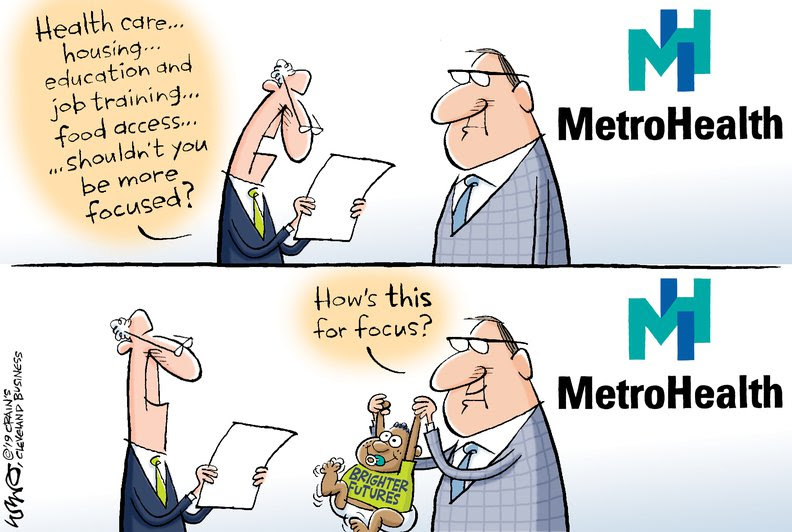Crain's editorial: A Healthy Start
By Crain's Cleveland Business Editorial Board

MetroHealth's ambitious, $1 billion-plus project to expand and transform its West 25th Street headquarters is just one portion of a much more far-reaching plan.
In speeches on June 7 at the City Club of Cleveland and at the health system's annual meeting on June 28, MetroHealth president and CEO Dr. Akram Boutros laid out a strategy to revitalize the neighborhood around that main campus and to address the social factors that affect the health and well-being of both individuals and communities.
"Advancing medical care has been the central focus of every hospital system," Boutros noted in the June 28 speech. "For MetroHealth, it is only part of what we do."
He declared a commitment to working with local partners and residents to build "a community that, like MetroHealth, welcomes all people. A neighborhood we all want to live in."
To that end, MetroHealth is making a $60 million investment to raise three buildings with a total of more than 250 affordable and market-rate apartments in the Clark-Fulton neighborhood. It also will offer incentives to encourage its employees to live close to its main campus or to upgrade their homes if they already live there.
Boutros has expressed the hope that MetroHealth's creation of new affordable housing might convince other investors to develop further projects in the neighborhood.
The system also is launching the Institute for H.O.P.E. (Health, Opportunity, Partnership and Empowerment), whose Economic Opportunity Center will be housed on the ground floor of the first apartment building to go up, at West 25th Street and Sackett Avenue. The center will include a grocery store, a food pantry and a community kitchen, as well as classrooms, legal aid services and office space for the institute's community partners.
In a program with AT&T, Digital C and MCPc, the institute is offering MetroHealth's neighbors living within 3 miles of the main campus access to affordable, high-speed internet, with participating households receiving a free laptop and training on computer use in English or Spanish. Next year, the institute will open a new Tri-C Access Center to provide job training and school-readiness programs to the neighborhood.
Citing out-of-pocket costs as a major barrier to care, Boutros also announced a commitment to "radically reduce" the cost of lab tests, imaging and infusions at new nonhospital locations over the next few years. In collaboration with a radiology equipment-maker, MetroHealth has formed Lumina Imaging, which by mid-2020 will open neighborhood radiology centers to offer CT scans and MRIs for up to 70% less than the cost at health systems.
In his City Club presentation, titled "What Hospitals Are Getting Wrong and How We Can Fix It," Boutros said, "There are no such things as neighborhood issues. These are our issues."
As part of MetroHealth's response, it last year became the first hospital system in the U.S. to adopt the licensed Open Table model for a larger population. It has so far launched five Tables — each comprising six to 10 volunteers who provide support, training and networking for a homeless or impoverished family for a year — with a commitment to put a total of 15 Tables in place, some of them Spanish-speaking for the area's Hispanic population, by the end of this year.
Noting that MetroHealth can't go it alone, Boutros challenged every company of at least 100 employees to sponsor one or more Tables, encouraging houses of worship and community groups to join in as well.
He also called out his audience, and the region as a whole, to redefine what constitutes good health care, replacing emphasis on the prestige of hospitals and their professionals — "medical care administered after the fact" — with a focus on real outcomes in the community — "health care before people get sick."
"We're just getting started," Boutros stated several times during his speech at the annual meeting.
It's an impressive start, and we applaud the vision behind it.
